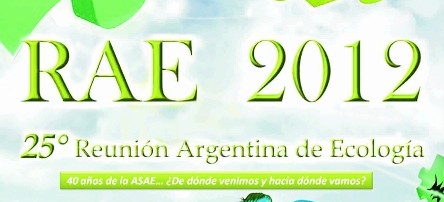 The Argentine Ecological Association (AsAE for its acronym in Spanish) will carry out its 25th annual meeting from 24-28 September in the city of Lujan. This year’s meeting coincides with the 40th anniversary of AsAE and is dedicated to “where we’ve come from; where we’re going”. OSARA has officially sponsored this meeting, specifically providing financial support for relevant symposia and activities related to our mission to promote research, education and conservation in southern Patagonia. To learn more visit the official website.
The Argentine Ecological Association (AsAE for its acronym in Spanish) will carry out its 25th annual meeting from 24-28 September in the city of Lujan. This year’s meeting coincides with the 40th anniversary of AsAE and is dedicated to “where we’ve come from; where we’re going”. OSARA has officially sponsored this meeting, specifically providing financial support for relevant symposia and activities related to our mission to promote research, education and conservation in southern Patagonia. To learn more visit the official website.
National Prize for Biodiversity and Sustainability Research Goes to Tierra del Fuego Lab
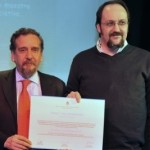 The Forest Resources Laboratory at CADIC (Ushuaia, Argentina) has received the 2012 Fidel Roig Prize for Biodiversity and Sustainability Research for its work on sustainable forestry in Tierra del Fuego. The award, given annually by the Argentine Ministry of Science and Technology, recognizes the research group whose activities have affected not only academic studies, but also decision making to influence true conservation in the country. The lab, led by Drs. Guillermo Martinez Pastur and Vanessa Lencinas, includes research associates, postdoctoral fellows, graduate students and technicians who work on an array of forest resources issues including economics, ecology and forestry. The prize of $10,000 USD and a medal was presented to Dr. Martinez Pastur by Minister Bergoñeo on 2 July 2012 in Buenos Aires. Congratulations to our friends and colleagues! http://www.mincyt.gov.ar/noticias/noticias_detalles.php?id_noticia=1004
The Forest Resources Laboratory at CADIC (Ushuaia, Argentina) has received the 2012 Fidel Roig Prize for Biodiversity and Sustainability Research for its work on sustainable forestry in Tierra del Fuego. The award, given annually by the Argentine Ministry of Science and Technology, recognizes the research group whose activities have affected not only academic studies, but also decision making to influence true conservation in the country. The lab, led by Drs. Guillermo Martinez Pastur and Vanessa Lencinas, includes research associates, postdoctoral fellows, graduate students and technicians who work on an array of forest resources issues including economics, ecology and forestry. The prize of $10,000 USD and a medal was presented to Dr. Martinez Pastur by Minister Bergoñeo on 2 July 2012 in Buenos Aires. Congratulations to our friends and colleagues! http://www.mincyt.gov.ar/noticias/noticias_detalles.php?id_noticia=1004
Sustainable Forestry – Lessons from Tierra del Fuego for the World
Working with a distinguished team of international colleagues, Guillermo Martinez Pastur recently published a global review article on sustainable forestry in BioScience, one of the most read journals in biological sciences. The article places particular emphasis on the example of Tierra del Fuego, where the Forestry Resources Lab at the Austral Center for Scientific Research (CADIC, Ushuaia, Argentina) has pioneered the harmonization of use and conservation in forested ecosystems since the 1990s.
Article Abstra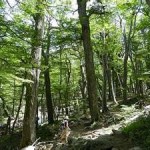 ct: The majority of the world’s forests are used for multiple purposes, which often include the potentially conflicting goals of timber production and biodiversity conservation. A scientifically validated management approach that can reduce such conflicts is retention forestry, an approach modeled on natural processes, which emerged in the last 25 years as an alternative to clearcutting. A portion of the original stand is left unlogged to maintain the continuity of structural and compositional diversity. We detail retention forestry’s ecological role, review its current practices, and summarize the large research base on the subject. Retention forestry is applicable to all forest biomes, complements conservation in reserves, and represents bottom-up conservation through forest manager involvement. A research challenge is to identify thresholds for retention amounts to achieve desired outcomes. We define key issues for future development and link retention forestry with land-zoning allocation at various scales, expanding its uses to forest restoration and the management of uneven-age forests.
ct: The majority of the world’s forests are used for multiple purposes, which often include the potentially conflicting goals of timber production and biodiversity conservation. A scientifically validated management approach that can reduce such conflicts is retention forestry, an approach modeled on natural processes, which emerged in the last 25 years as an alternative to clearcutting. A portion of the original stand is left unlogged to maintain the continuity of structural and compositional diversity. We detail retention forestry’s ecological role, review its current practices, and summarize the large research base on the subject. Retention forestry is applicable to all forest biomes, complements conservation in reserves, and represents bottom-up conservation through forest manager involvement. A research challenge is to identify thresholds for retention amounts to achieve desired outcomes. We define key issues for future development and link retention forestry with land-zoning allocation at various scales, expanding its uses to forest restoration and the management of uneven-age forests.
Article Citation: Gustafsson, L., S.C. Baker, J. Bauhus, W.J. Beese, A. Brodie, J. Kouki, D.B. Lindenmayer, A. Lõhmus, G. Martínez Pastur, C. Messier, M. Neyland, B. Palik, A. Sverdrup-Thygeson, W.J.A. Volney, A. Wayne & J.F. Franklin. 2012. Retention forestry to maintain multifunctional forests: a world perspective. BioScience 62: 633-645.
OSARA Collaborates on Atlas for Tierra del Fuego
 In collaboration with the University of Magallanes’ GIS Laboratory, coordinated by Dr. Sergio Opazo, OSARA has been collaborating in the development of a thematic atlas for the Tierra del Fuego Archipelago to highlight tourism, ecological and cultural attractions. The project, funded by a FIC-R grant directed by Ernesto Davis, intends to produce high quality visual material and content in a bilingual book format, which is expected to be published in 2012. OSARA has coordinated the writing of the chapter entitled “Sub-Antarctic Ecology,” including the collaboration of 6 co-authors from the U.S., Chile and Argentina who synthesize a decade of first hand research and information on the region for a general audience, as well as to promote sustainable tourism.
In collaboration with the University of Magallanes’ GIS Laboratory, coordinated by Dr. Sergio Opazo, OSARA has been collaborating in the development of a thematic atlas for the Tierra del Fuego Archipelago to highlight tourism, ecological and cultural attractions. The project, funded by a FIC-R grant directed by Ernesto Davis, intends to produce high quality visual material and content in a bilingual book format, which is expected to be published in 2012. OSARA has coordinated the writing of the chapter entitled “Sub-Antarctic Ecology,” including the collaboration of 6 co-authors from the U.S., Chile and Argentina who synthesize a decade of first hand research and information on the region for a general audience, as well as to promote sustainable tourism.
OSARA’s International Coordinator Named to Post as Wildlife Research Director for Southern Patagonian National Parks
Dr. Alejandro V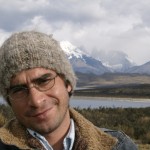 alenzuela, who has been OSARA’s International Field Course Coordinator since 2010, was recently named the coordinator of wildlife research for Argentina’s southern Patagonian national parks. His position, based in Ushuaia, Tierra del Fuego, will assist the regional director in the planning and execution of studies and management of parks in Tierra del Fuego, Santa Cruz and Chubut Provinces. Specifically, Dr. Valenzuela will bring to bear his expertise in invasive species to determine management and control options for the protected areas, as well as help to design long-term monitoring and research priorities to better use the parks as a network of study sites and to improve their sustainable use. Congratulations Alejandro and this opens a whole new host of opportunities to link research with management throughout Patagonia and its links as well to existing OSARA activities.
alenzuela, who has been OSARA’s International Field Course Coordinator since 2010, was recently named the coordinator of wildlife research for Argentina’s southern Patagonian national parks. His position, based in Ushuaia, Tierra del Fuego, will assist the regional director in the planning and execution of studies and management of parks in Tierra del Fuego, Santa Cruz and Chubut Provinces. Specifically, Dr. Valenzuela will bring to bear his expertise in invasive species to determine management and control options for the protected areas, as well as help to design long-term monitoring and research priorities to better use the parks as a network of study sites and to improve their sustainable use. Congratulations Alejandro and this opens a whole new host of opportunities to link research with management throughout Patagonia and its links as well to existing OSARA activities.
Socio-Ecological Research Advances in Tierra del Fuego
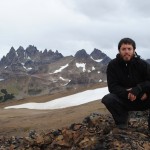 Jean-Paul Zagarola, a Master’s of Science in Biology student at the University of North Texas, recently defended his thesis entitled “A Socio-Ecological Analysis of Southern Patagonian Watersheds”. Zagarola’s research, which was funded by a Fulbright Scholarship and a National Science Foundation grant (OISE 0854350), was the first in the region to combine empirical scientific ecological methods with social science surveys to link the “ability” of watersheds to provide ecosystem services, and the way that the local community perceives and values these services. In this way, the work is meant to combine social and ecological information to determine whether or not existing management plans are meeting social needs and expectations, thereby integrating ecology and social well being.
Jean-Paul Zagarola, a Master’s of Science in Biology student at the University of North Texas, recently defended his thesis entitled “A Socio-Ecological Analysis of Southern Patagonian Watersheds”. Zagarola’s research, which was funded by a Fulbright Scholarship and a National Science Foundation grant (OISE 0854350), was the first in the region to combine empirical scientific ecological methods with social science surveys to link the “ability” of watersheds to provide ecosystem services, and the way that the local community perceives and values these services. In this way, the work is meant to combine social and ecological information to determine whether or not existing management plans are meeting social needs and expectations, thereby integrating ecology and social well being.
New Publication on Invasive Species Management in Tierra del Fuego
 Collaborators from OSARA, the University of Magallanes, Patagonia Wildlife Ltda, and the Chilean Agriculture and Livestock Service recently published a new article in the journal Anales Zoologici Fennici. The study, which was based on the research conducted by Ernesto Davis for his undergraduate thesis, helps resolve important technical issues regarding the implementation of effective trapping for invasive mink in Tierra del Fuego. The findings show that it is possible to conduct trapping that does not affect non-target species by applying relatively simple modifications to the trap design. This project also illustrates the successful collaborations that OSARA promotes between the academic and governmental/management sectors.
Collaborators from OSARA, the University of Magallanes, Patagonia Wildlife Ltda, and the Chilean Agriculture and Livestock Service recently published a new article in the journal Anales Zoologici Fennici. The study, which was based on the research conducted by Ernesto Davis for his undergraduate thesis, helps resolve important technical issues regarding the implementation of effective trapping for invasive mink in Tierra del Fuego. The findings show that it is possible to conduct trapping that does not affect non-target species by applying relatively simple modifications to the trap design. This project also illustrates the successful collaborations that OSARA promotes between the academic and governmental/management sectors.
Davis, E.F., C.B. Anderson, A.E.J. Valenzuela, J.L. Cabello & N. Soto (2012). American mink (Neovison vison) trapping in the Cape Horn Biosphere Reserve: enhancing current trap systems to control an invasive predator. Anales Zoologici Fennici 49: 18-22.
New Fulbrighter in Tierra del Fuego!
OSARA is proud to announce that  Jon Henn (B.S. Biology, St. Olaf College) has been awarded a Fulbright Scholarship to conduct research in Tierra del Fuego on riparian forest regeneration in areas affected by invasive beavers. Under the mentorship of Dr. Christopher Anderson of OSARA and Drs. Guillermo Martinez Pastur and Vanessa Lencinas at the Austral Center for Scientific Research (CADIC) in Ushuaia, Mr. Henn will conduct a year-long study that integrates plant physiological and ecological information to better understand the potential to actively promote regeneration of riparian forests in Tierra del Fuego that have been degraded by beavers. Together, this team is applying for additional research funding for the project from National Geographic and the Argentine Ministry of Agriculture, while one research grant has already been secured from the Argentine Science and Technology Agency.
Jon Henn (B.S. Biology, St. Olaf College) has been awarded a Fulbright Scholarship to conduct research in Tierra del Fuego on riparian forest regeneration in areas affected by invasive beavers. Under the mentorship of Dr. Christopher Anderson of OSARA and Drs. Guillermo Martinez Pastur and Vanessa Lencinas at the Austral Center for Scientific Research (CADIC) in Ushuaia, Mr. Henn will conduct a year-long study that integrates plant physiological and ecological information to better understand the potential to actively promote regeneration of riparian forests in Tierra del Fuego that have been degraded by beavers. Together, this team is applying for additional research funding for the project from National Geographic and the Argentine Ministry of Agriculture, while one research grant has already been secured from the Argentine Science and Technology Agency.
Rufford Grant for Nature Funds Study that Could Help Promote Riparian Forest Restoration in Southern Patagonia
 Dr. Rosina Soler, a postdoctoral fellow at the Austral Center for Scientific Research (CADIC) in Ushuaia, Argentina, has recently completed the first phase of an important new study on forest regeneration and sustainability. With the support of a Rufford Grant for Nature (U.K.), since 2010, Dr. Soler’s project has explored the effects of invasive beavers on ñirre forests (Nothofagus antarctica), a biome that has previously been left out of ecological studies of forestry and invasive species. Her findings show that the ñirre is much more resilient to beaver disturbance than the other forest types in the archipelago, providing evidence that this species could be a good candidate to promote active restoration in other parts of the island in areas that have been degraded by beavers. This project is a collaborative endeavor that also includes the CADIC Forestry Resources Lab and OSARA.
Dr. Rosina Soler, a postdoctoral fellow at the Austral Center for Scientific Research (CADIC) in Ushuaia, Argentina, has recently completed the first phase of an important new study on forest regeneration and sustainability. With the support of a Rufford Grant for Nature (U.K.), since 2010, Dr. Soler’s project has explored the effects of invasive beavers on ñirre forests (Nothofagus antarctica), a biome that has previously been left out of ecological studies of forestry and invasive species. Her findings show that the ñirre is much more resilient to beaver disturbance than the other forest types in the archipelago, providing evidence that this species could be a good candidate to promote active restoration in other parts of the island in areas that have been degraded by beavers. This project is a collaborative endeavor that also includes the CADIC Forestry Resources Lab and OSARA.
Linking Tierra del Fuego and Alaska
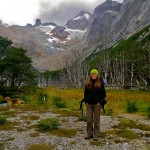 As part of its mission to promote research, education and conservation in southern Patagonia, OSARA coordinated the first student exchange between Alaska and Tierra del Fuego. As “mirror” sites at the two extremes of the Americas, the comparison of high latitude forests is an ideal research and learning opportunity. In 2010, OSARA’s president visited the University of Alaska-Fairbanks to learn about the university and the Bonanza Creek LTER. Now, with the internship of Becky Hewitt (Ph.D. candidate) we have achieved the first site-site interchange. Becky’s project, funded by a National Science Foundation International Research Experience for Students Award (OISE 0854350), allowed her to spend approximately two months from December 2011 to February 2012 studying at the Austral Center for Scientific Research (CADIC), under the mentorship of Dr. Guillermo Martinez Pastur. Her research project explored the effect of forestry management on soil ectomycorrhizal fungi, and their subsequent role in determining vegetation patterns. During her stay in CADIC she also had the opportunity to discuss her project with the U.S. Ambassador to Argentina, and later visited the U.S. Embassy in Buenos Aires to relate how this opportunity could be enhanced for more US/Tierra del Fuego exchanges.
As part of its mission to promote research, education and conservation in southern Patagonia, OSARA coordinated the first student exchange between Alaska and Tierra del Fuego. As “mirror” sites at the two extremes of the Americas, the comparison of high latitude forests is an ideal research and learning opportunity. In 2010, OSARA’s president visited the University of Alaska-Fairbanks to learn about the university and the Bonanza Creek LTER. Now, with the internship of Becky Hewitt (Ph.D. candidate) we have achieved the first site-site interchange. Becky’s project, funded by a National Science Foundation International Research Experience for Students Award (OISE 0854350), allowed her to spend approximately two months from December 2011 to February 2012 studying at the Austral Center for Scientific Research (CADIC), under the mentorship of Dr. Guillermo Martinez Pastur. Her research project explored the effect of forestry management on soil ectomycorrhizal fungi, and their subsequent role in determining vegetation patterns. During her stay in CADIC she also had the opportunity to discuss her project with the U.S. Ambassador to Argentina, and later visited the U.S. Embassy in Buenos Aires to relate how this opportunity could be enhanced for more US/Tierra del Fuego exchanges.
Enhancing Social Science Collaborations
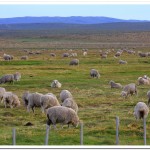 To truly explore the way the world works, scientists, authorities and the general public increasingly recognize the need to integrate the social and ecological dimensions of ecosystems. Therefore, OSARA actively promotes such collaborations, but historically there has been a crucial capacity gap in the social sciences due to a lack of researchers in southern Patagonia. Now, Dr. Laura Ogden (anthropology, Florida International University, USA) and Dr. Brendon Larson (social dimensions of natural sciences, Waterloo University, Canada) have begun pilot projects in Tierra del Fuego. Specifically, the two participated with Dr. Christopher Anderson, of OSARA, in a field excursion during December 2011, coordinated by Ciencia Austral, to get a first hand experience of the island, its landscapes, flora/fauna and people. During this time the team was also able to discuss potential projects and develop ideas for collaborations between the U.S., Canada, Chile and Argentina. Initially, Dr. Ogden intends to study the relationship of ranchers and ranch hands with nature, while Dr. Larson is more broadly interested in future comparisons between this high latitude biome and his own in Canada. Besides OSARA and Ciencia Austral, Dr. Ogden’s project involves the collaboration of the Wildlife Conservation Society, which manages the Karukinka Natural Park. Together with WCS, Dr. Ogden also is developing a science/art project with a Santiago-based museum curator. We look forward to continuing this initial pilot project and developing better and stronger relationships between social and natural scientists and academia and local communities.
To truly explore the way the world works, scientists, authorities and the general public increasingly recognize the need to integrate the social and ecological dimensions of ecosystems. Therefore, OSARA actively promotes such collaborations, but historically there has been a crucial capacity gap in the social sciences due to a lack of researchers in southern Patagonia. Now, Dr. Laura Ogden (anthropology, Florida International University, USA) and Dr. Brendon Larson (social dimensions of natural sciences, Waterloo University, Canada) have begun pilot projects in Tierra del Fuego. Specifically, the two participated with Dr. Christopher Anderson, of OSARA, in a field excursion during December 2011, coordinated by Ciencia Austral, to get a first hand experience of the island, its landscapes, flora/fauna and people. During this time the team was also able to discuss potential projects and develop ideas for collaborations between the U.S., Canada, Chile and Argentina. Initially, Dr. Ogden intends to study the relationship of ranchers and ranch hands with nature, while Dr. Larson is more broadly interested in future comparisons between this high latitude biome and his own in Canada. Besides OSARA and Ciencia Austral, Dr. Ogden’s project involves the collaboration of the Wildlife Conservation Society, which manages the Karukinka Natural Park. Together with WCS, Dr. Ogden also is developing a science/art project with a Santiago-based museum curator. We look forward to continuing this initial pilot project and developing better and stronger relationships between social and natural scientists and academia and local communities.
Southern Patagonia Represented at World Conference on Biological Invasions
 With the support of OSARA, a major contingent of researchers and students participated in the 2nd World Conference on Biological Invasions and Ecosystem Functioning (BIOLIEF), held from 21 to 24 November, 2011 in Mar del Plata, Argentina. Students from Ushuaia, Argentina and Punta Arenas, Chile had research posters at the event, and senior researchers from both countries also gave oral presentations. OSARA’s International Coordinator Dr. Alejandro Valenzuela also led a part of this team in writing a manuscript entitled “Linking Invasive Species and Their Ecosystem Impacts: Tierra del Fuego as a Natural Laboratory to Test Theory and Determine Action,” which will be part of a special edition of the journal Acta Oecologica, edited by Dr. Jorge Gutierrez of the Grupo de Investigación y Educación en Temas Ambientales – GrIETA.
With the support of OSARA, a major contingent of researchers and students participated in the 2nd World Conference on Biological Invasions and Ecosystem Functioning (BIOLIEF), held from 21 to 24 November, 2011 in Mar del Plata, Argentina. Students from Ushuaia, Argentina and Punta Arenas, Chile had research posters at the event, and senior researchers from both countries also gave oral presentations. OSARA’s International Coordinator Dr. Alejandro Valenzuela also led a part of this team in writing a manuscript entitled “Linking Invasive Species and Their Ecosystem Impacts: Tierra del Fuego as a Natural Laboratory to Test Theory and Determine Action,” which will be part of a special edition of the journal Acta Oecologica, edited by Dr. Jorge Gutierrez of the Grupo de Investigación y Educación en Temas Ambientales – GrIETA.
Alliance Building between Scientists and Managers
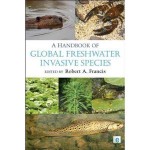 Researchers and managers from southern Chile and Argentina came together to analyze the socio-political process that has led to taking action against invasive beavers in the Tierra del Fuego Archipelago, publishing their findings in a new book chapter entitled “Building alliances between research and management to better control and mitigate the impacts of an invasive ecosystem engineer: the pioneering example of the North American beaver in the Fuegian Archipelago of Chile and Argentina.” It is hoped that the example of inter-institutional and international collaboration, being promoted by OSARA in Tierra del Fuego, will be a useful case study in other parts of the world. The chapter is part of a thorough and timely book published in December 2011 until the title of A Handbook of Global Freshwater Invasive Species, edited by Dr. Robert Francis and Earthscan Publishing. The team of authors included academics from the U.S., Chile and Argentina, as well as managers from Chile’s Agriculture and Livestock Service and the private wildlife management company Patagonia Wildlife Ltda. The chapter also included two master’s students as part of OSARA’s commitment to education and training in southern Patagonia.
Researchers and managers from southern Chile and Argentina came together to analyze the socio-political process that has led to taking action against invasive beavers in the Tierra del Fuego Archipelago, publishing their findings in a new book chapter entitled “Building alliances between research and management to better control and mitigate the impacts of an invasive ecosystem engineer: the pioneering example of the North American beaver in the Fuegian Archipelago of Chile and Argentina.” It is hoped that the example of inter-institutional and international collaboration, being promoted by OSARA in Tierra del Fuego, will be a useful case study in other parts of the world. The chapter is part of a thorough and timely book published in December 2011 until the title of A Handbook of Global Freshwater Invasive Species, edited by Dr. Robert Francis and Earthscan Publishing. The team of authors included academics from the U.S., Chile and Argentina, as well as managers from Chile’s Agriculture and Livestock Service and the private wildlife management company Patagonia Wildlife Ltda. The chapter also included two master’s students as part of OSARA’s commitment to education and training in southern Patagonia.
OSARA Teams with Private Sector to Better Manage Invasive Species
 Patagonia Wildlife Ltda. is a new wildlife management company founded in Punta Arenas, Chile by José Luis Cabello and Antonieta Rodriguez. This endeavor is a first of its kind in Chile, attempting to link scientific methods with sound environmental management in the private sector. OSARA recently teamed up with Patagonia Wildlife, supporting their project with the Laguna Parrillar National Park to control beavers. Hopefully, this will be the start of a new and fruitful collaborative venture between academia, the private sector and environmental management!
Patagonia Wildlife Ltda. is a new wildlife management company founded in Punta Arenas, Chile by José Luis Cabello and Antonieta Rodriguez. This endeavor is a first of its kind in Chile, attempting to link scientific methods with sound environmental management in the private sector. OSARA recently teamed up with Patagonia Wildlife, supporting their project with the Laguna Parrillar National Park to control beavers. Hopefully, this will be the start of a new and fruitful collaborative venture between academia, the private sector and environmental management!
